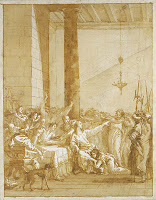Collect for Holy Saturday
O God, Creator of heaven and earth: Grant that, as the crucified body of your dear Son was laid in the tomb and rested on this holy Sabbath, so we may await with him the coming of the third day, and rise with him to newness of life; who now lives and reigns with you and the Holy Spirit, one God, for ever and ever. Amen.
Raising Hell
His body was cold and stiff when it went in on Good Friday. It will be warm and alive on Easter morning. What happens in between, while the tomb is sealed?
To answer that question, some in the early Church developed a doctrine that came to be called the Harrowing of Hell. Building on references in the New Testament, it tells us that Jesus went down to the underworld, the land of the dead. There he met those who had died, from Adam and Eve onward, and led them out of the prison of death into eternal life. In paintings and icons of the Resurrection, we often see Jesus leading the way out of the empty tomb, with other people visible in the background, following him.
I’ve always loved that image. I love it because it shows Jesus literally raising hell: going down to those most distant from God and bringing them back up. It gives me hope that Jesus can reach me too, no matter how far I fall from God’s presence. Not even the tomb could keep him away from his children. What could possibly keep him from me?
I believe we share Jesus’ ministry of raising hell. The world is full of people who feel separated from God. Some feel separated by desperate circumstances, facing hunger, disease or homelessness. Others feel separated by abuse, or mental illness, or simply by living on the margins of a world that doesn’t want to see them. So we bring them food, healing and shelter. We bring them justice, compassion and dignity. We follow Christ down into their hell, and by his grace we raise it up.
It doesn’t make us popular. The world doesn’t like hell-raisers. It doesn’t like seeing the people it would rather ignore. It doesn’t like hearing about the hell those people have been raised from. And it really doesn’t like thinking about how we, in our collective sin, may have kept them there. The world may call us troublemakers. Bleeding hearts. These days, it may even call us socialists!
To which there is one simple response: So what? No one is beyond God’s reach; no one is undeserving of the freedom Jesus brings. And not one of us is exempt from the baptismal promise to go to them, to “seek and serve Christ in all people.” If doing that means raising a little hell along the way, so be it.
The Rev. Drew Bunting
Rector
Church of the Resurrection, Mukwanago















